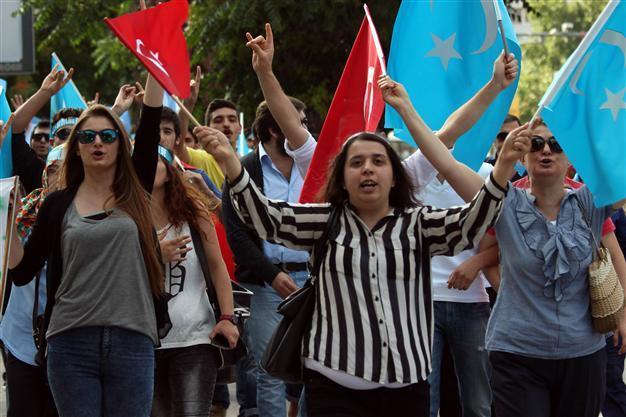Turkey probes attack on Koreans, China rules out Uighur discrimination
ISTANBUL / BEIJING

Turkish nationalists demonstrate in front of the Chinese Embassy in Ankara, on July 5, 2015, to denounce the Chinese governments policies on Uyghur Muslims. AFP photo
Turkey has launched a probe on an attack on Korean tourists, who were mistaken for being Chinese, in Istanbul, as China rules out claims of discrimination against its Uighur minorities.
The relations between China and Turkey have been strained over Turkish media reports suggesting that Uighurs are currently banned from worship and fasting during the Muslim month of Ramadan.
Istanbul police launched an investigation into the attack on a group of Korean tourists on July 4, in the city’s touristic Sultanahmet Square, after two of the Koreans testified and filed a complaint against the assailants, Doğan News Agency reported.
A group of nationalists from far-right “Idealist Hearths” (Ülkü Ocakları), which has close links with the Nationalist Movement Party (MHP), attacked a group of Korean tourists, thinking that they were Chinese, after marching to protest China’s restrictions on the religious freedom of ethnic Uighur Muslims in Xinjiang.
The police intervened and prevented the group from attacking the tourists, by using tear gas to disperse the nationalist group following the incident.
Meanwhile, the group’s headquarters in Istanbul denied the attack had happened, adding that everyone’s security of life and property, no matter what their nation or religion was, was entrusted to them.
“Such an offensive incident as alleged has never occurred,” their statement read.
On July 6, China refuted having “ethnic problems” in its far west and stated its Muslim Uighur minorities there “enjoyed” freedom of religion.
“Uighurs live and work in peace and contentment and enjoy freedom of religion under the rules in the constitution,” Reuters reported China’s Foreign Ministry spokeswoman Hua Chunying as saying at a regular briefing.
“So the so-called ‘Xinjiang ethnic problem’ you mention that has been raised in some reports simply does not exist,” she added.
In a statement released on June 30, Turkey’s Foreign Ministry had expressed “deep concern” to China about reports that Beijing had instilled a fasting ban on segments of its Uighur Muslim population.
“It has been publicly heard with sorrow that there are reports of bans on fasting and the fulfilling of religious duties by Uighur Turks,” it stated.
Foreign Minister Mevlüt Çavuşoğlu later told reporters that Turkey closely followed the Uighur issue.
“They are important to us; we declare our connection with them in every occasion. We also let the Chinese officials know that it is very natural for us to react against a human rights violation there when it happens,” he said.
Speaking at a news briefing, Chinese Vice-Foreign Minister Cheng Guoping said the Muslim Uighur militants, who the country alleges to operate as the East Turkestan Islamic Movement (ETIM), had connections to the Islamic State of Iraq and the Levant (ISIL).
“It can be said that the ETIM certainly has links with ISIL and has participated in relevant terrorist activities. China is paying close attention to this and will have security cooperation with relevant countries,” Reuters reported Guoping as saying.
